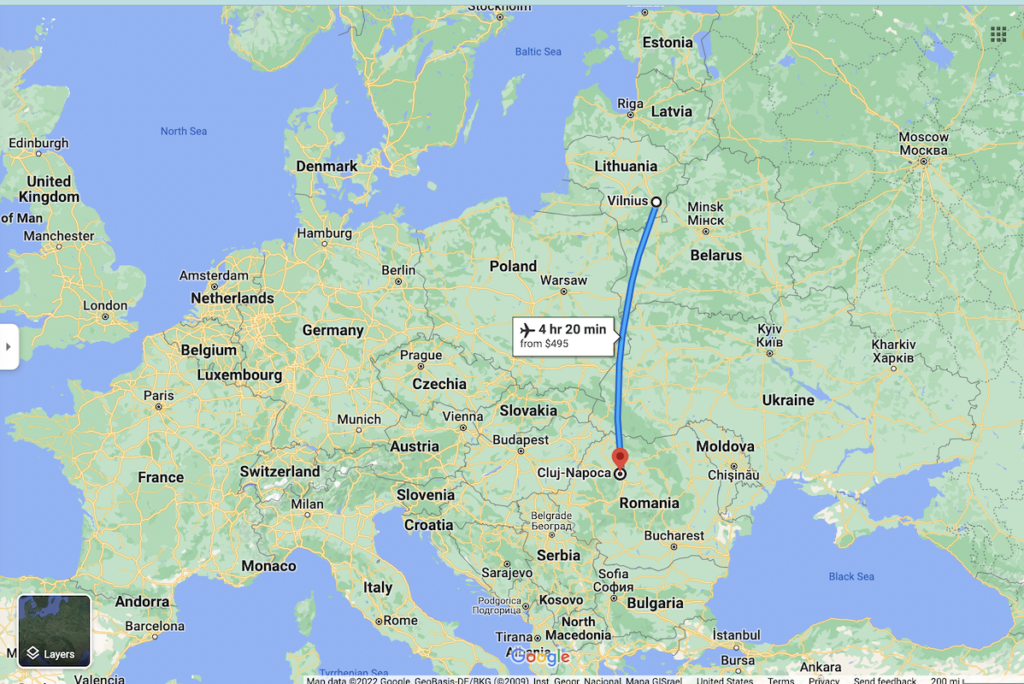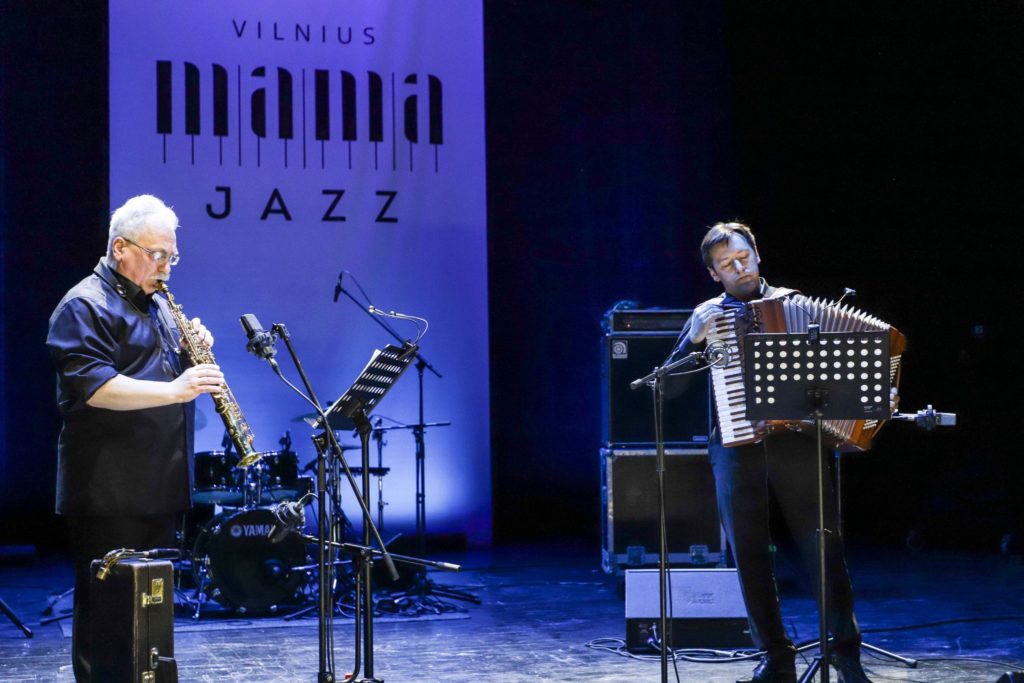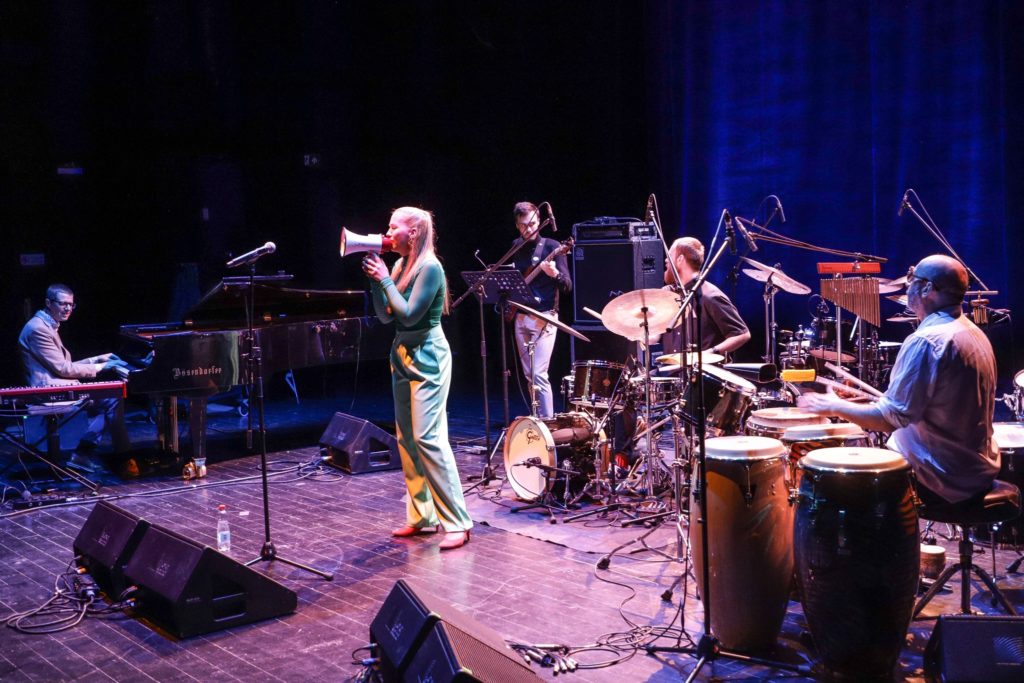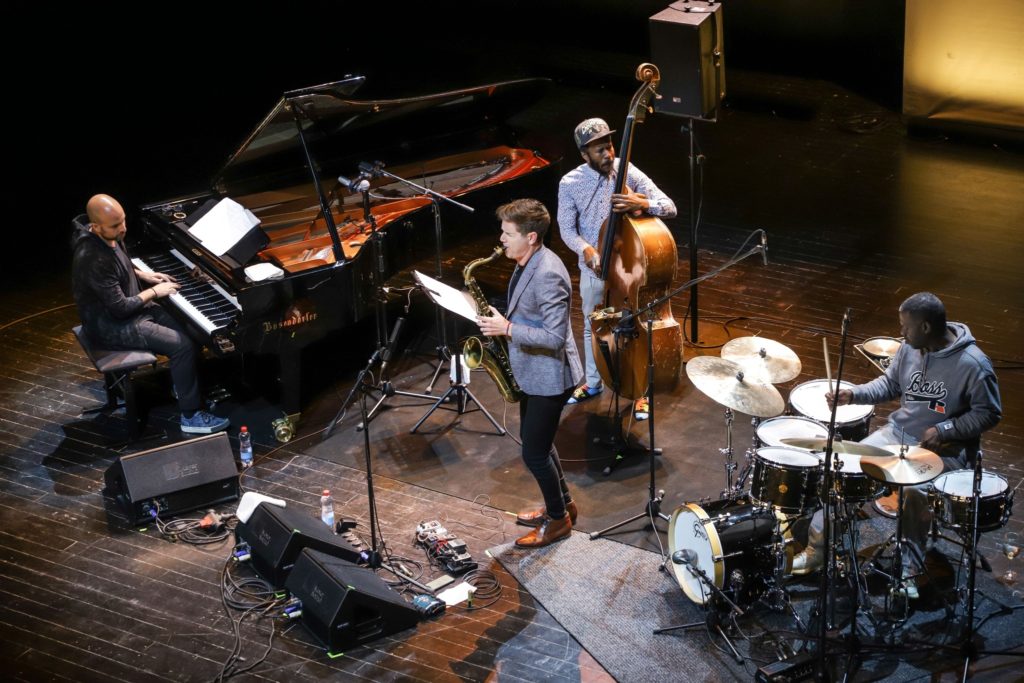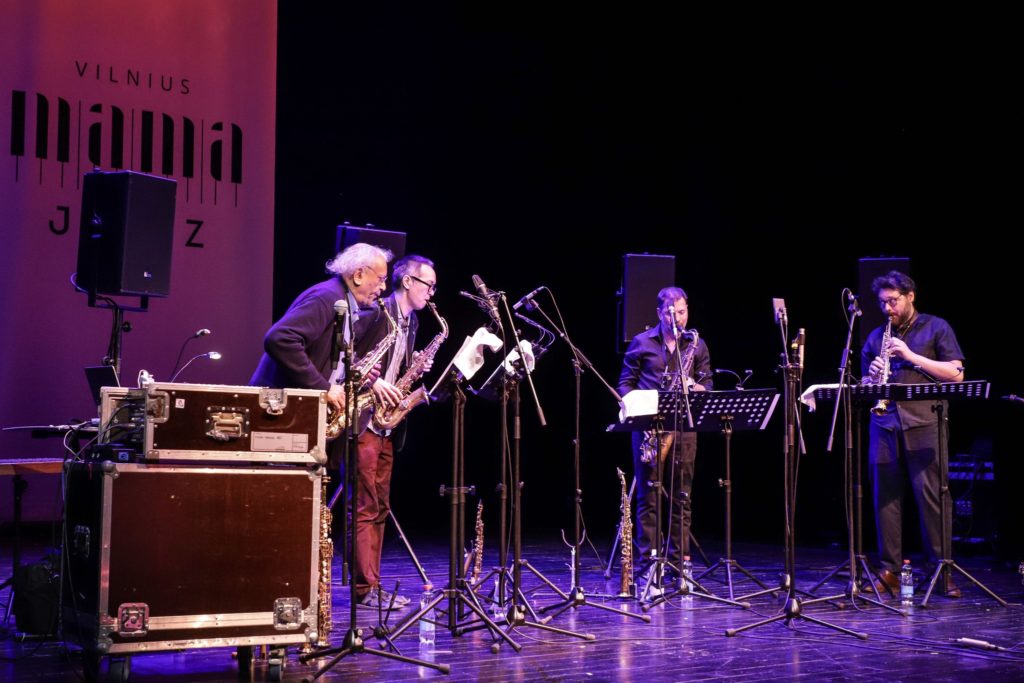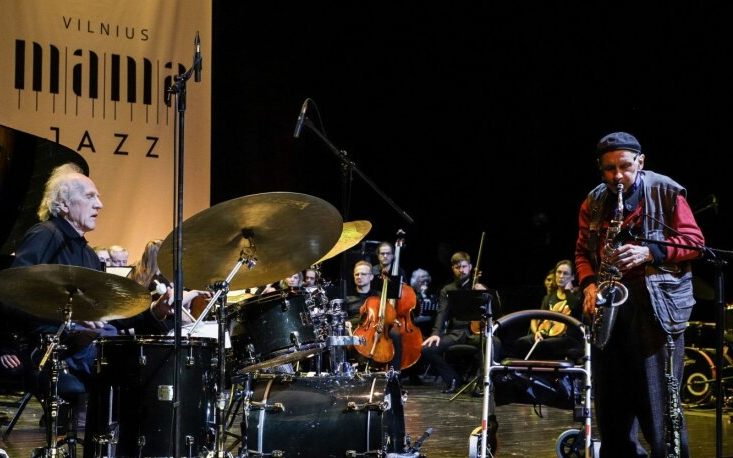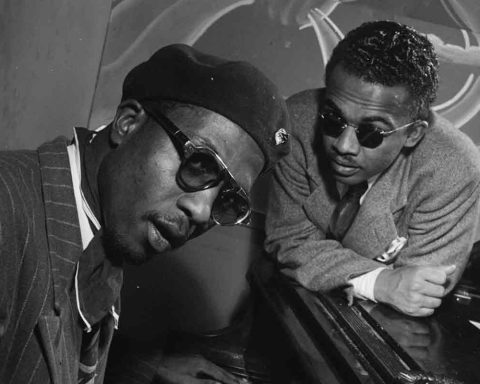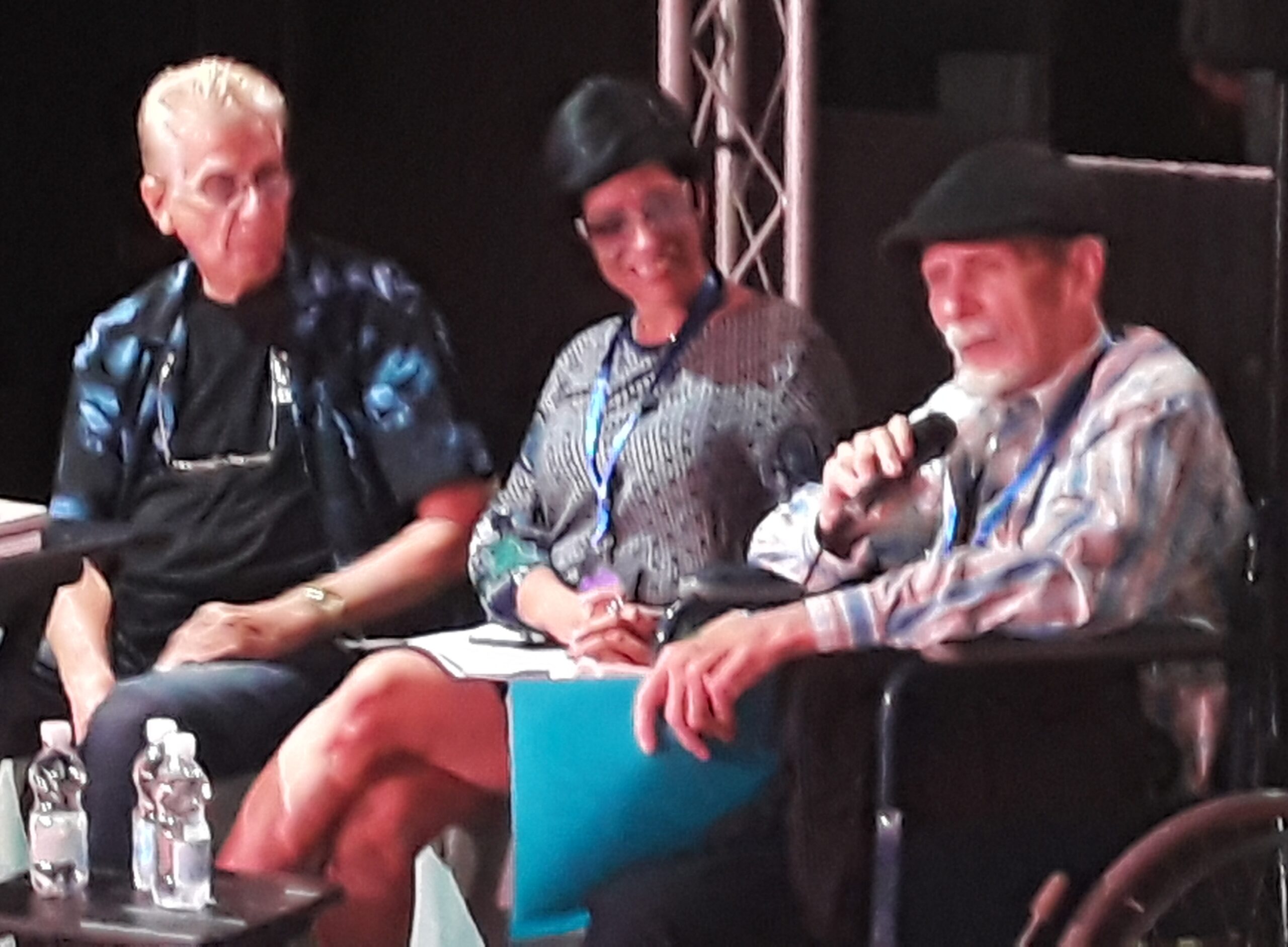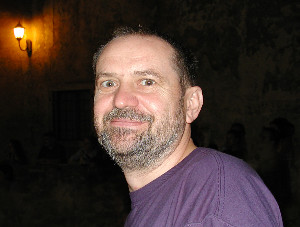Anthony Braxton’s ensemble “systematizing unconventional sounds, grouped on atonal principles” received a standing ovation from a full house; frail but valiant Vladmir Chekasin staged his ambitious Suite for Free People, percussionist Vladimir Tarasov led a trio with Ukrainian musicians, audiences cheered a Snarky Puppy spinoff and world-class home-grown artists at the 21st edition of the Vilnius Mama Jazz festival, held May 26 -29 at the Lithuanian National Drama Theater, reports Virgil Mihaiu, the JJA’s Romanian correspondent (photos by Dainius Labutis).
The three so-called Baltic republics – Lithuania, Latvia and Estonia – boast contributions to the jazz world inversely proportional to their geographical size.
The chapters devoted to them in the History of European Jazz, edited by Francesco Martinelli provide credible information in this regard and my own experience substantiates it.
As the good friends around me have not completely disappeared, Bucharest’s jazzologist Paul Tutungiu mediated my invitation to the 21st edition of the Vilnius Mama Jazz festival. The pretty name comes from the sobriquet of Mrs. Judita Bartoseviciene, founder of this world-class event. As airlines to date do not seem too interested in the cultural potential of the above-mentioned states, travel to the Lithuanian capital from my wonderful home city of Cluj, Romania involves quasi-adventurous arrangements starting with a 4 am flight to unfriendly Luton airport in southern England, waiting there until late afternoon to recross the continent west to east in a very crowded low-cost plane with very narrow seat-space, landing around 9:30 pm. However, thanks to the goodwill of coordinator Danas Mikailionis, a true jazz promoter, my dream of returning to Vilnius after 33 years was fulfilled. And with maximum intellectual-emotional gains!
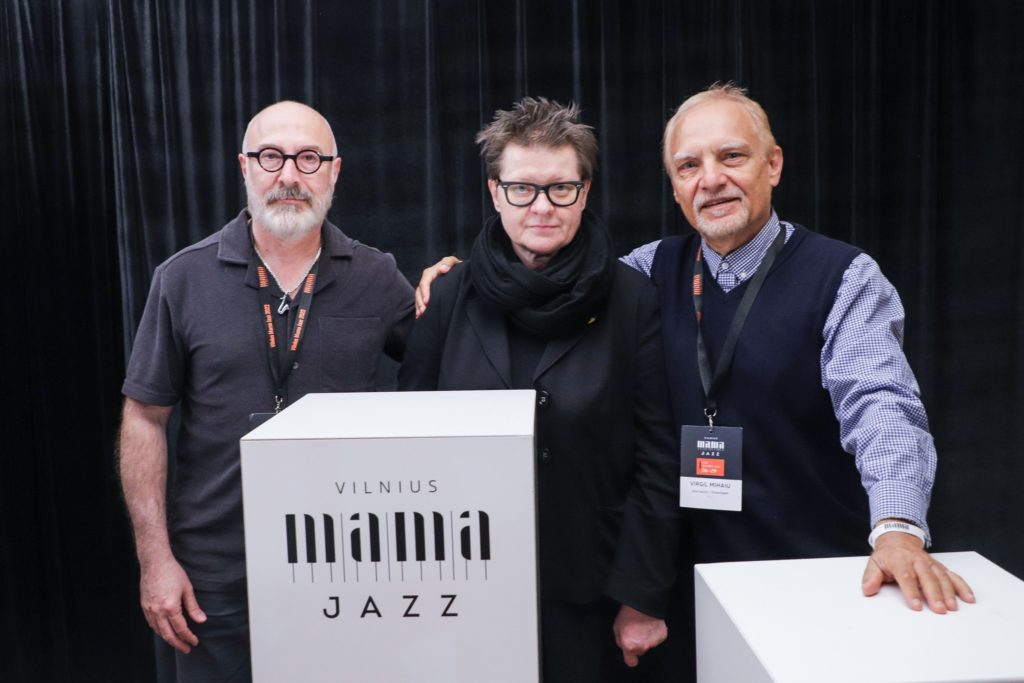
From its very beginning in 2002, the festival has aimed to present varied, exciting and even controversial aspects of a quintessentially polymorphic musical genre. Everything takes place in an environment of civility, understanding of differing visions and respect for their values. The host building is an architectural gem: the National Drama Theater of Lithuania, renovated during the global sanitary-necessitated shutdown of sad recent memory.
The respect for culture shown by Lithuanian officials is also reflected in the decision that the 2022 edition of the festival would mark the reopening of the performance hall. On the spot, one realizes that the public in attendance is informed, cultivated, receptive, appreciative, not at all imprisoned in generational prejudice or personal taste; in turn, musicians can be satisfied with the superior performing prerequisites at their disposal.
Befittingly, in her chapter for the aforementioned History of European Jazz, Ruta Skudiene wrote that, despite the vicissitudes of history, “… jazz took root in the heart of Lithuanian culture. Musicians with academic training embraced it, and it came to be identified with a manifestation of outstanding creativity, a vehicle for even the most radical kinds of musical expression.”
Two afternoons of the Festival were dedicated to a showcase of ten Lithuanian bands. Some of them would have deserved to be included in the gala program itself, but the producers’ dilemma is whom to select from such a comprehensive range of talents!
In any case, the duo of saxophonist Vytautas Labutis and accordionist Andrius Balachovicius was overwhelming. I saw and even emceed Labutis when he performed within Vladimir Chekasin’s Quartet on the stage of the Transylvania Philharmonic in Cluj, in the 1980s. It was a joy to meet him again in full form, dexterously juggling what he called the “Lithuanian free jazz species” with inflections of klezmer, polka or bagpipe effects (obtained by blowing simultaneously on the soprano saxophone and the alto’s mouthpiece), alternating with rigorous unisons knit with his congenial comrade. A dense and original show, worthy of the most demanding scenes.
The Laivo Troupe sextet left a similar impression, with its bright themes, based on fetching timbre alloys of Simonas Kaupinis, tuba & trombone; Kristupas Jusinskas, sax and flute; Kazimieras Jusinskas, saxophones. The smart arrangements, the fragmented musical discourse, the moments of accelerating or retarding during the collective improvisations, the pronounced playful touch, all seemed opportune evocations of the personality of Charles Mingus, whose centennial was celebrated in April 2022.
Veronika Chichi Quintet is a valuable asset for Lithuanian jazz, as a representation of ultimate energy, swing and professionalism. The foreground belongs to the versatile vocalist Veronika ChiChi (stage name derived from Cicinskaite), able to navigate through different moods, to use a portable megaphone instead of the conventional mic, and sing ballads with sfumato vocal effects. She is supported by the imaginative piano flow generated by Dmitry Golovanov (look for his recent solo-piano album Heritage). The frenetic rhythm section consists of Arturs Duckis, acoustic and electric basses; Domantas Razmus, drums, and inexhaustible percussionist Arkadij Gotesman.
If the bands with an electronic profile excelled almost exclusively in sound intensity, the youngest generation brought about pleasant surprises. Two ensembles were made up of amazingly mature adolescents: 21st Century Quintet (with Davit Avetisyan on sax and Andrius Savcenko on keyboards) and the Lithuanian Youth Jazz Orchestra conducted by Austeja Kimbartaite, whose core consists of members of the Klaipeda big band and students of the Kaunas Jazz Academy.
The list of musicians invited from abroad comprised notable names of current jazz. Two groups were derived from bands that had established themselves around the turn of the 21st century. The Scandinavian supergroup Rymden relies on the rhythmic tandem that had achieved fame with late Swedish pianist Esbjorn Svensson. In their new trio bassist Dan Berglund and drummer Magnus Ostrom join another formidable keyboardist, Norwegian Bugge Wesseltoft. The latter’s appetite for protean jocularity – exercised (often simultaneously) on synthesizers and the concert piano – is now crowned by a surplus of delicacy, which has also contaminated his “space exploration” partners. An unexpected openness to areas of tenuity and even tenderness is revealed in the interaction of the three musicians, previously recognized rather for their quasi-expressionist strength.
In its turn, the band Ghost Note was initiated (in 2015) by two former Snarky Puppy members – percussionists Robert Searight and Nate Werth. The current members of the band had had runs in the company of American music stars such as Prince, Herbie Hancock, Kendrick Lamar and Marcus Miller, but its personnel is unpredictable. Depending on circumstances, another ten companions may join the basic nonet. Hence the great flexibility with which the repertoire is approached and deliberately oriented towards a potential dancing audience. The postmodern stylistic mix, agglutinating soul, jazz, hip-hop, edm and Afrobeat influences claims forerunners such as James Brown or Sly and the Family Stone, with the intention of generating futuristic funk.
American saxophonist Ben Wendel also returned to the festival stage, having been in the Vilnius
Mama Jazz in 2014 with the group Kneebody, this time with his own quartet. Each of the members has already reached a high level of performance, Ben as a multifaceted musician – saxophone virtuoso but also composer capitalizing on his skills as a pianist and bassoonist, being involved in prestigious collaborations, teaching activities, interdisciplinary projects, etc. His proposed music, a perpetual attempt to perfect the neo-hard-bop legacy, assumes as a tutelary model in the figure of Joshua Redman. Pianist Shai Maestro, bassist Joe Sanders and drummer Greg Hutchinson act in the same spirit, with delightful refinement but somewhat on their own. The result is a kaleidoscope of superimposed sound images, from which I distinguished the finesse of the Israeli pianist with delicate allusions to the aesthetics of Ahmad Jamal, as well as Hutchinson’s inexhaustible rhythmic fantasy. His performance can be defined as a continuous drum solo.
In 2018 at Romania’s Bran Festival, I noted the talent of the young Gregoy Privat, born in Martinique. At that time, his elusive piano extemporizations stood out in the quartet led by Swedish double-bass player Lars Danielsson. In Vilnius, Privat performed solo, superimposing electronically obtained vocal polyphonies on a “filigree” instrumental technique, reflecting the way in which the artist tried to overcome the constraints of two years of globally imposed interpersonal distance. He is a sentimental romantic, able to translate his optimistic nature into generous harmonies, metaphorical flashes or singable themes for which he requests (and obtains) the collaboration of the public. In the long run, however, such a solo variant can slip into narcissistic mannerisms. As such, to continue the upward course of Privat’s career, integration in a group context would seem to serve him better.
The Vilnius event makes a name for itself by inviting legendary jazz personalities, even if they evade comfortable classifications — such as Anthony Braxton. His contribution to the evolution of the notion of jazz itself is undeniable, though his music is fundamentally non-concessive, extremely conceptualized, almost opaque to mainstream listeners (not to mention “acoustic fast food consumers”).
To calm his opponents, Braxton prefers to consider himself a creative music composer. Having explored countless aggregation formats – from solo sax to large orchestras – here he presented a
saxophone quartet, with three cohorts who have absorbed into his inventions: Chris Jonas (credits with Cecil Taylor and Butch Morris, among others; managed Braxton’s Tri-Centric Foundation); Taiwanese-born James Fei (also involved in his own experimental music and sound installations, etc.); Andre Vida (appealing to the velvety sonority of the baritone saxophone, intent on combining the art of sound with that of images). The program consisted of long passages of an apparent randomness, however predetermined by the score, separated by intensely chromed “harmonic curtains,” about the duration of a breath.
Such compositions might be characterized as an operation of systematizing unconventional sounds, grouped on atonal principles. The aesthetic result calls up the tightness of hermetic poetry. In the music compositions by Anthony Braxton, whose personal interests include mathematics and chess, the suggestion of sui generis jazz can be perceived subliminally. Unlikely as it may seem considering today’s anti-cultural menaces, in Vilnius the Braxton Quartet was give a well-deserved standing ovation by a crowded hall.
One explanation for the admirable availability of this audience would be that it was formed (just like the amazing Lithuanian jazz school) under the auspices of the insurmountable Trio of pianist Vyacheslav Ganelin, reeds player Vladimir Chekasin, and percussionist Vladimir Tarasov. They were born in Russia but grew up in the more liberal Baltic states during the post-Stalinist period. Here, they established a school – literally: thanks to them, since 1975 promotions brilliant practitioners of improvisation have emerged, one after the other, at the Vilnius Jazz Conservatory.
Since Ganelin’s emigration to Israel in 1987, Chekasin and Tarasov have perpetuated their heroic
artistic deeds in the reborn Lithuanian state to this day. In 2017, the three legendary masters of avant-garde jazz were awarded the country’s highest cultural distinction: the Lithuanian National Prize for Culture and Art. In the context of the current war threats, Tarasov proposed to the Mama Jazz festival a recital entitled “We Stand with Ukraine,” performed together with two artists from that country: pianist Volodymyr Solianyk and double bassist Mark Tokar. The latter came to Vilnius Mama Jazz in conditions of force majeure, directly from the front, where he fought as a volunteer. The music consisted of long individual solos, but also some interesting passages of collective improvisation, proving that jazz muses can raise their voices in defense of peace, even when surrounded by the hideous roar of weapons.
The culmination of the 2022 edition of the Vilnius Mama Jazz festival was the jubilee concert dedicated to Chekasin on his 75th birthday. As expected, the protagonist designed an impressive program entitled “Suite for Free People,” taking on multiple roles: composer, saxophonist / keyboardist, conductor, stage movement coordinator, etc.
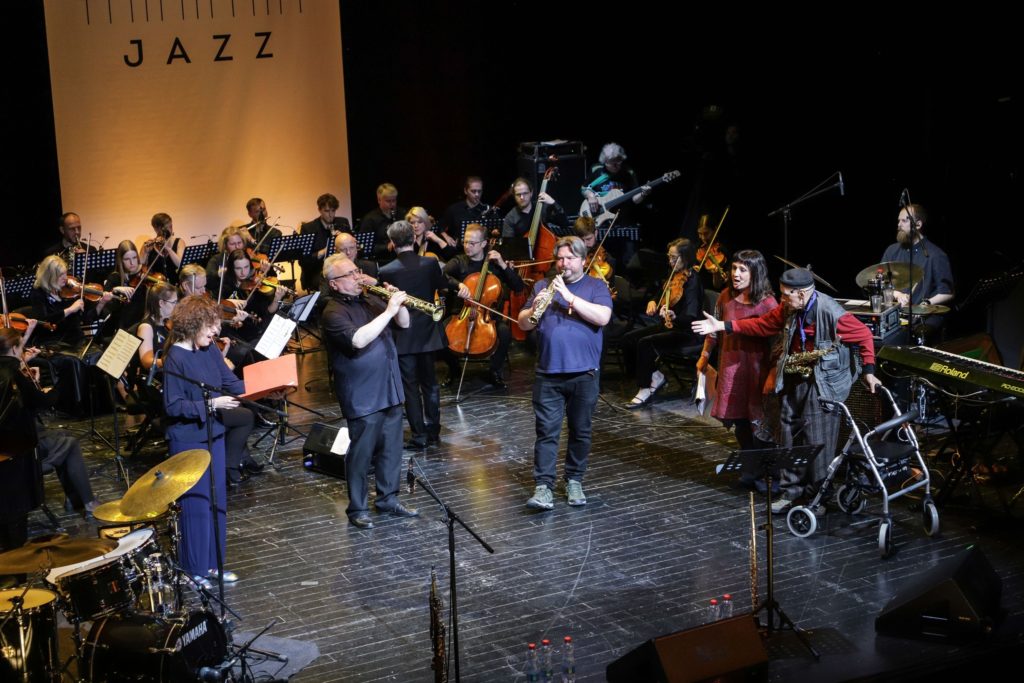
The work has testamentary dimensions (which is not surprising for a composer who made an entire show based on Leonid Andreev’s play Man’s Life). It is a large-scale work – provocative, indefinable, unpredictable, tumultuous. Despite his frail physical condition, Chekasin maintains his full ability to use saxophones, to which he adds electronic effects, keyboards, equivocal side remarks muttered into a microphone attached to his skull. There are also moments of instrumental theater, in which the protagonist persiflages his own condition – and implicitly the inexorable end of life – moving on stage either in a wheelchair or holding on to it, to start dialogues with other musicians.
By the way, among the “chosen ones” are personalities deeply involved in the long-term flourishing of Lithuanian jazz: Tarasov himself, with his peerless percussion interventions, saxophonists Vytautas Labutis and Liudas Mockunas, pianists Petras Geniusas and Richardas Banys, vocalist and flutist Neda Malunaviciute, bassist Leonid Shinkarenko, drummer Domantas Razmus and one of Chekasin’s two daughters, vocalist Larisa Stannow. The Saint Christopher Chamber Orchestra, conducted by Modestas Barkauskas, had a very special role. Its classically trained musicians have entered a fertile state of resonance with the demands of Chekasin – expressed through his ambiguous, humorous sign language.
The comprehensive sound of the orchestra created an aura of grandeur, as if to compensate for Chekasin’s tragicomic action of defying death through play. From the multitude of unconventional sounds accumulated in the saxophonist’s arsenal, I retained especially those similar to suspiration, as an evocation of the extremities of life – birth and atonement.
The four days of the festival included – in addition to the actual galas – openings of exhibitions, the launching of Vladimir Tarasov’s autobiographical book A Drummer’s Diary, the screening of Chekasin’s film Bolero from 1992, panels on current issues (the effects of global restrictions on Lithuanian jazz musicians, or the role of radio in the Spotify era, etc.), but also the conference “Facing the Inevitable: About the Democracy of Death” by philosopher Tamas Sinkunas. Other reasons for this event to become unforgettable were the friendly encounters – with festival emcee Julijus Grickevicius, representatives of the Lithuanian Jazz Federation, as well as about 20 promoters and jazz critics from around the world invited to the festival. Thanks for the marvelous experience!

